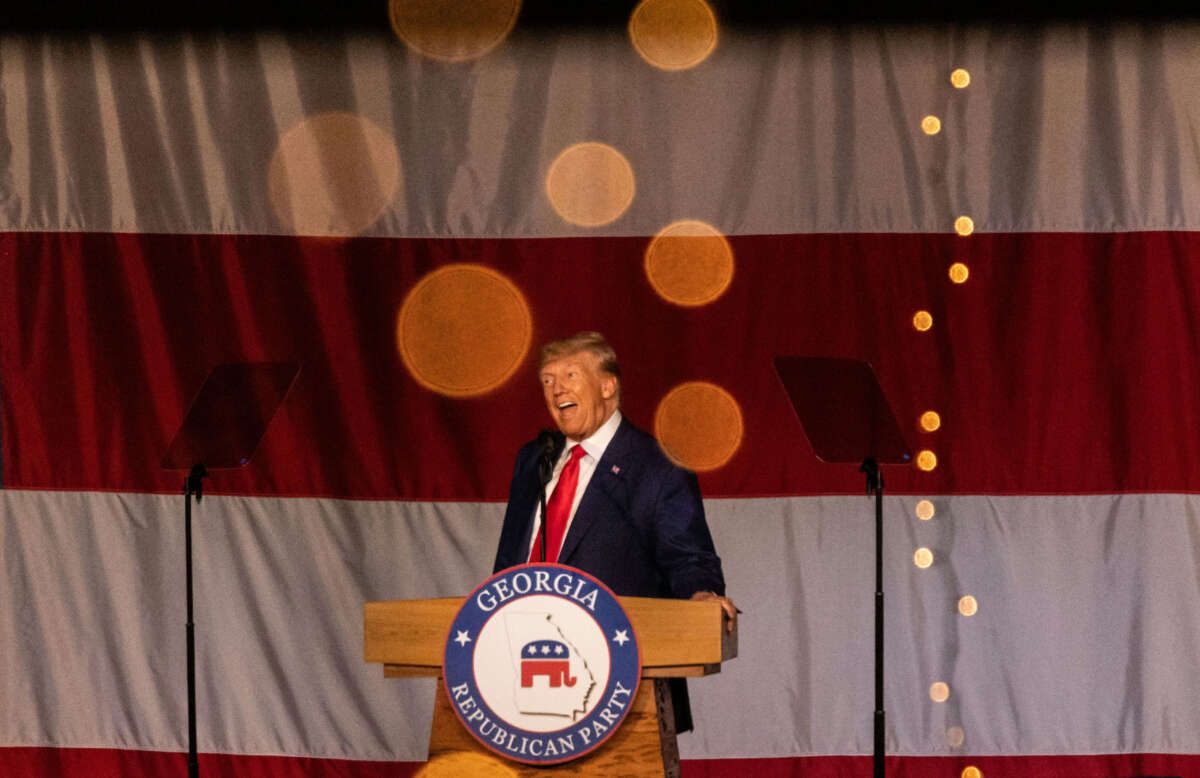Did you know that Truthout is a nonprofit and independently funded by readers like you? If you value what we do, please support our work with a donation.
Special counsel Jack Smith’s letter informing former President Donald Trump that he is the target of the Justice Department’s Jan. 6 investigation signaled that he could be charged with a civil rights law that dates back to the post-Civil War Reconstruction era, three sources told The New York Times.
The letter cited three criminal statutes, including conspiracy to defraud the government and obstruction of an official proceeding, which were both included in the criminal referral from the House Jan. 6 committee. But the third law cited in the letter “was a surprise,” according to the Times.
The letter referred to Section 241 of Title 18 of the United States Code, which makes it a crime to “conspire to injure, oppress, threaten, or intimidate any person” in the “free exercise or enjoyment of any right or privilege secured to him by the Constitution or laws of the United States.”
The law was enacted after the Civil War to target Southern whites, including Ku Klux Klan members, who engaged in terrorism to prevent previously enslaved Black people from voting but in recent years has been used more broadly to target voting fraud conspiracies.
The potential charge is an “ironic twist,” wrote Charlie Savage, one of the Times journalists who reported on the development. “The modern usage of the law raised the possibility that Mr. Trump, who baselessly declared the election he lost to have been rigged, could face prosecution on accusations of trying to rig the election himself,” the report added.
The law has been applied in cases of casting false votes or falsely counting votes after an election, according to the Times, “even if no specific voter could be considered the victim.”
In one 1950 ballot-stuffing case, a judge wrote that the right to an honest election tally “is a right possessed by each voting elector, and to the extent that the importance of his vote is nullified, wholly or in part, he has been injured in the free exercise of a right or privilege secured to him by the laws and Constitution of the United States.”
A 1974 Supreme Court opinion upheld the use of the law to charge West Virginians who case fake votes. Every voter “has a right under the Constitution to have his vote fairly counted, without its being distorted by fraudulently cast votes,” Justice Thurgood Marshall wrote.
The development suggests that Smith may be targeting efforts by Trump and his associates to overturn his loss in several states, including his call to Georgia Secretary of State Brad Raffensperger demanding he “find” enough votes to overturn his loss and the plot to use fake electors to cast votes for Trump in states won by President Joe Biden. The call is also under investigation by Fulton County, Ga. District Attorney Fani Willis, who is expected to hand down indictments next month.
“It seems like under 241 there’s at least a right to an honest counting of the votes,” Norm Eisen, who served as a Democratic counsel during Trump’s first impeachment, told the Times. “Submitting an alternate electoral certificate to Congress (as opposed to casting false votes or counting wrong) is a novel scenario, but it seems like it would violate this right.”
Georgia “will be key” in Smith’s Sec. 241 theory, tweeted Georgia State University Law Prof. Anthony Michael Kreis.
“Given how focused Trump was on Georgia — the pressure on state officials, the conspiracy theories concocted about Fulton County, and the use of fake electors in an attempt to defraud — all to violate the rights of Georgia voters,” he wrote.
But some legal experts also believe the law could be used to apply to Trump fomenting a mob to attack the Capitol on Jan. 6.
“It would also be in keeping with 241’s historic application to use of violence in deprivation of right to vote. Could explain Smith’s interest [into] threats of violence to election officials which culminates in use of violent mob on Jan. 6,” New York University Law Prof. Ryan Goodman wrote on Twitter.
“It depends on the evidence Jack Smith has gathered,” he added. “Otherwise the most straightforward application of 241 is the plot to cast aside peoples’ votes.”
Smith’s team has also shown an interest in the story of Georgia election worker Ruby Freeman, who was forced to flee her home with her daughter after receiving death threats when Trump and his allies falsely accused them of pulling fraudulent ballots from a suitcase, according to The Associated Press.
“Jack Smith is said to be looking at 18 USC § 1512, which is about tampering with witnesses who have information relevant to a federal investigation. That could certainly have possible applicability to Ruby Freeman and Shaye Moss who were harassed by Trump and his allies,” Kreis wrote. “This is also unlawful under Georgia law and the parallel provisions of the OCGA that bar election worker harassment and intimidation will likely be used by Fani Willis next month.”
Speaking against the authoritarian crackdown
In the midst of a nationwide attack on civil liberties, Truthout urgently needs your help.
Journalism is a critical tool in the fight against Trump and his extremist agenda. The right wing knows this — that’s why they’ve taken over many legacy media publications.
But we won’t let truth be replaced by propaganda. As the Trump administration works to silence dissent, please support nonprofit independent journalism. Truthout is almost entirely funded by individual giving, so a one-time or monthly donation goes a long way. Click below to sustain our work.
